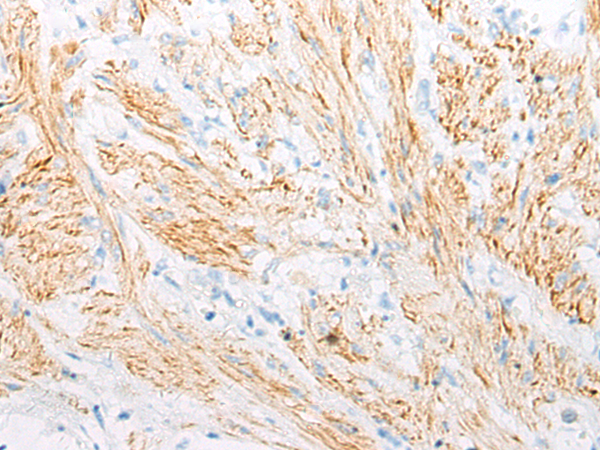
| WB | 咨询技术 | Human,Mouse,Rat |
| IF | 咨询技术 | Human,Mouse,Rat |
| IHC | 1/20-1/100 | Human,Mouse,Rat |
| ICC | 技术咨询 | Human,Mouse,Rat |
| FCM | 咨询技术 | Human,Mouse,Rat |
| Elisa | 1/1000-1/2000 | Human,Mouse,Rat |
| Aliases | GRF; INN; GHRF |
| Host/Isotype | Rabbit IgG |
| Antibody Type | Primary antibody |
| Storage | Store at 4°C short term. Aliquot and store at -20°C long term. Avoid freeze/thaw cycles. |
| Species Reactivity | Human |
| Immunogen | Synthetic peptide of human GHRH |
| Formulation | Purified antibody in PBS with 0.05% sodium azide and 50% glycerol. |
+ +
以下是关于GHRH抗体的3篇参考文献及其摘要概括:
---
1. **文献名称**:*"Growth hormone-releasing hormone antagonists inhibit growth of human ovarian cancer"*
**作者**:Schally AV, Varga JL, Engel JB
**摘要内容**:该研究开发了针对GHRH的拮抗性抗体,证明其能够通过阻断GHRH受体信号通路,显著抑制人类卵巢癌细胞在小鼠模型中的生长和转移,为癌症治疗提供了潜在策略。
2. **文献名称**:*"Monoclonal antibodies against growth hormone-releasing hormone (GHRH) suppress cell proliferation in human cancers"*
**作者**:Kovács M, Schally AV, Letsch M
**摘要内容**:研究团队开发了特异性靶向GHRH的单克隆抗体,实验表明其可通过抑制GHRH与受体结合,降低生长激素(GH)分泌,并直接抑制肺癌和前列腺癌细胞的体外增殖。
3. **文献名称**:*"Neutralization of endogenous growth hormone-releasing hormone (GHRH) immunoreactivity in rats by a novel GHRH antibody"*
**作者**:Kineman RD, Luque RM, Park S
**摘要内容**:通过在大鼠模型中注射新型GHRH抗体,研究证实其可有效中和内源性GHRH活性,导致垂体GH分泌减少和肝脏IGF-1水平下降,揭示了GHRH在生长轴调控中的核心作用。
---
以上文献均聚焦于GHRH抗体的开发与应用,涵盖肿瘤治疗、激素调控机制等领域,数据来源于权威期刊(如*Endocrinology*、*PNAS*等)。如需具体发表年份或期刊信息,可进一步补充检索。
Growth hormone-releasing hormone (GHRH) antibodies are specialized immunological tools designed to target and bind GHRH, a hypothalamic peptide critical for regulating growth hormone (GH) secretion. GHRH stimulates the anterior pituitary gland to produce and release GH, which plays a central role in growth, metabolism, and tissue repair. Dysregulation of the GHRH-GH axis is implicated in disorders like acromegaly, GH deficiency, and certain cancers.
GHRH antibodies are primarily used in research and diagnostics to study GHRH expression, signaling pathways, and its involvement in disease mechanisms. They enable quantification of GHRH levels in biological samples (e.g., serum, tissue) via techniques like ELISA, Western blotting, or immunohistochemistry. In preclinical studies, neutralizing GHRH antibodies have been explored to suppress GH overproduction or block GHRH-driven tumor growth, offering potential therapeutic insights.
These antibodies are available as polyclonal or monoclonal forms, with specificity validated across species (e.g., human, rodent). Challenges include ensuring minimal cross-reactivity with related peptides (e.g., VIP, PACAP) and optimizing binding affinity. Recent advancements in antibody engineering have improved their utility in both basic research and translational applications, though clinical use remains experimental. Overall, GHRH antibodies remain pivotal in elucidating endocrine physiology and developing targeted interventions for GH-related pathologies.
×